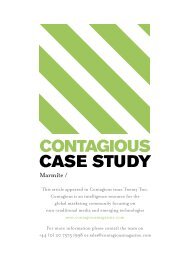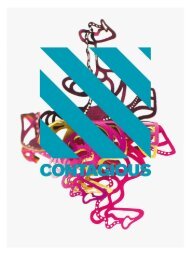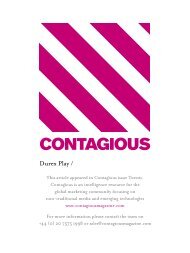MostContagious2012.pdf - Contagious Magazine
MostContagious2012.pdf - Contagious Magazine
MostContagious2012.pdf - Contagious Magazine
You also want an ePaper? Increase the reach of your titles
YUMPU automatically turns print PDFs into web optimized ePapers that Google loves.
payMent / the<br />
changing way we<br />
pay we pay<br />
Much of this change is driven by<br />
smartphones. Mobile money is far from<br />
being reliant on NFC, as the success<br />
of Square demonstrates. The disruptive<br />
startup has had a boost this year<br />
following a $25m investment from<br />
Starbucks. The Square Mobile Wallet<br />
can now be used to pay at 7,000 Starbucks<br />
stores across the US. And just<br />
this month it announced that it’s processing<br />
$10bn in payments annually.<br />
As people learn to pay via multiple<br />
devices, they are also becoming<br />
more open to new units of exchange,<br />
ranging from in-game virtual currency<br />
to social currency.<br />
www.google.com/wallet<br />
squareup.com<br />
Wallaby /<br />
Wallets bursting with multiple credit<br />
cards have become emblematic of<br />
our times. According to Experian’s<br />
‘National Score Index’, 10% of Americans<br />
have more than ten credit cards.<br />
Having so many payment options<br />
means consumers are rarely using<br />
them in the most efficient way – a phenomenon<br />
that Wallaby aims to counteract<br />
through the creation of ‘one card<br />
to rule them all.’ The service solves the<br />
conundrum of which credit card to<br />
use to maximise savings and points by<br />
letting people add credit cards to a centralised<br />
system. When paying online or in<br />
store, Wallaby automatically sifts through<br />
the users’ cards, and crunches which one<br />
should be used to maximise returns.<br />
The way in which Wallaby helps consolidate<br />
and organise multiple payment offerings<br />
is analogous to Passbook (see Loyalty<br />
section). It points to a future where payment<br />
and loyalty increasingly converge and<br />
become more frictionless.<br />
www.walla.by<br />
Barclays / Pingit<br />
While banks tend to be known for making<br />
life more complicated, Barclays in the UK<br />
released an app in February that makes<br />
transferring money incredibly simple. Pingit<br />
lets users transfer up to £300 a day to<br />
other people using just their mobile phone<br />
number. The average order value of each<br />
transaction is £70, higher than current<br />
NFC mobile payment services, which are<br />
usually capped at about £20.<br />
Mobile banking has being growing exponentially<br />
but this has largely come from<br />
developing countries, where access to<br />
formal financial services is lower than in the<br />
West. Last year, for example, Visa aped the<br />
success of mobile money transfer service<br />
M-Pesa by introducing a mobile payment<br />
service in Africa for people without bank<br />
accounts.<br />
Pingit has had an enthusiastic reception<br />
in the UK, which could well set a precedent<br />
for future mobile banking offerings in<br />
this market. Within two days of the service<br />
launching, 20,000 users had signed up and<br />
it has now attracted more than 1.2 million<br />
downloads. Barclays claims that a significant<br />
amount of these are non-customers,<br />
with Pingit now helping Barclays to acquire<br />
more new customers than any of its other<br />
online acquisition tools.<br />
www.barclays.co.uk/pingit<br />
Barclaycard / PayBand<br />
While Barclays’ Pingit works via a mobile<br />
phone, Barclaycard has been developing<br />
frictionless payment solutions in more unusual<br />
contexts.<br />
At this summer’s London Wireless music<br />
festival, Barclaycard debuted PayBand,<br />
an NFC-enabled wristband that allowed<br />
festival-goers to make cashless payments.<br />
People signed up for a free PayBand,<br />
loaded it with up to £250 a day, then wore<br />
it around the festival site, negating the need<br />
to carry extra cash or cards. To pay for items<br />
from stallholders users simply swiped the<br />
band on a card payment system.<br />
PayBand is an imaginative evolution of<br />
Barclaycard PayTag, a credit card sticker<br />
that, when stuck to a mobile handset, enables<br />
contactless payments. Both PayTag<br />
and PayBand demonstrate that NFC isn’t<br />
MOVEMENTs purpose sErVicE data technology design social biz sharing amplified screens augmented retail personalise new loyalty payment sbpf<br />
54










